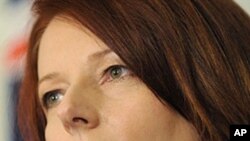Australian Prime Minister Julia Gillard has named former leader Kevin Rudd as her foreign minister, less than three months after she ousted him in an unexpected political coup. Ms. Gillard has announced sweeping changes to her Cabinet after this week securing the support of key independent lawmakers, which allowed her to form Australia's first minority government since 1940.
Former Australian Prime Minister Kevin Rudd's appointment to the high-profile position of foreign minister is seen as a consolation for being ousted from the leadership of the governing Labor Party just weeks before the election.
Mr. Rudd, a fluent Mandarin speaker, is well qualified for the post of foreign minister. Before entering politics he was a senior diplomat and spent years working and studying in China - one of Australia's most important trade and diplomatic partners.
Rudd is also seen as capable of enhancing Australia's close military and economic relationship with the United States.
Following his appointment, Mr. Rudd said he would use his position to promote greater international stability.
"Australia's foreign policy has as its fundamental objective the maintenance of our national security, the maintenance of our national sovereignty, the advancing of our national interests and building with our friends and partners and allies a rules based order for all countries of the world to enhance peace and prosperity across the family of nations," he said.
Rudd's appointment has been criticized by opposition politicians. Deputy Liberal Party leader Julie Bishop said the man who was ousted by his own party because he was distant and lacked inter-personal skills is now "Australia's number one diplomat."
Rudd's return to the cabinet is part of a revamp of Prime Minister Julia Gillard's administration. Australia's first female leader heads a minority government following the closest election in the country's history. Despite receiving less votes and winning fewer seats than the conservative opposition, Ms. Gillard's Labor Party managed to cling to power with the support of three independent lawmakers and a member of the Greens.
Former foreign minister Stephen Smith will become defense minister, while there are also changes to the key positions of climate change and immigration. Smith will have responsibility for policy on Afghanistan, where Australia has around 1,600 troops.
Australian PM Gillard Names New Cabinet




